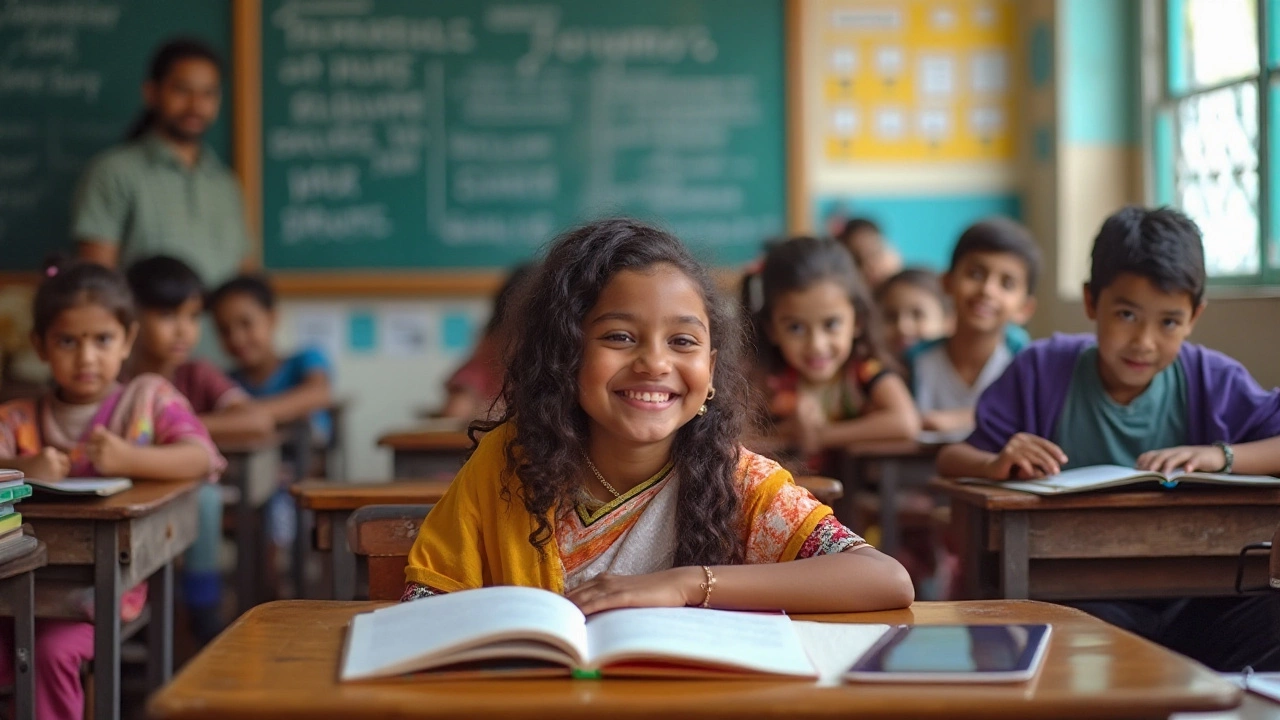
The CBSE syllabus is the bedrock of educational standards in India, providing a comprehensive framework for schools and students to follow. Recognized for its well-crafted curriculum, the syllabus is designed by experts with a focus on holistic student development.
Offering a rich blend of subjects ranging from humanities to sciences, the CBSE syllabus strives to cater to diverse learning needs. Its goal isn't just academic excellence but the overall growth of students, preparing them for higher education and beyond.
This guide dives into the details of what makes the CBSE syllabus a cornerstone of education in India, and it's filled with insights perfect for students, educators, and parents striving for academic success.
- What is the CBSE Syllabus?
- Structure and Content Overview
- Key Subjects and Topics Covered
- How is the CBSE Syllabus Designed?
- Updates and Recent Changes in the Syllabus
- Tips for Students and Parents
What is the CBSE Syllabus?
The Central Board of Secondary Education (CBSE) syllabus is a meticulously crafted framework designed to guide the education system in over 24,000 CBSE-affiliated schools in India and abroad. Known for its robust academic structure, the CBSE syllabus ensures consistent and equal education standards across these institutions. It encompasses a wide range of subjects, catering to the diverse interests and aptitudes of students, from science, mathematics, and social sciences to languages and arts. The key aim of this curriculum is to provide comprehensive education that not only leads to the acquisition of knowledge but also encourages intellectual inquiry and critical thinking among students.
At its core, the CBSE syllabus is aligned with the National Curriculum Framework, which is shaped by the National Council of Educational Research and Training (NCERT). This alignment ensures that the curriculum remains dynamic and pertinent to the changing educational needs, societal demands, and global developments. One of the hallmark features of the CBSE syllabus is its flexibility, allowing for the integration of vocational training and skill-based learning, which are essential in today’s swiftly evolving world. By emphasizing conceptual understanding and analytical abilities, the CBSE syllabus equips students not just with factual knowledge, but with the intellectual tools to apply these concepts practically.
According to Dr. Biswajit Saha, CBSE's Director of Training and Skill Education, "The CBSE curriculum focuses on creating a learning ecosystem that encourages mindful education, where emphasis is laid on understanding and application rather than rote learning."
The design of the CBSE syllabus undergoes regular reviews and updates, reflecting the board’s commitment to maintaining its global competitiveness and relevance. These updates often include modern pedagogical approaches and a focus on building life skills. For instance, recent additions include modules on environmental education, financial literacy, and digital fluency, preparing students to navigate the 21st-century landscape adeptly. The syllabus is structured to cater to all levels of schooling, from primary to senior secondary, ensuring continuous and progressive learning.
Understanding the detailed layout of the CBSE syllabus begins with recognizing its bifurcation across primary, secondary, and senior secondary stages. The primary stage focuses on laying the foundational skills in language, numeracy, and social sciences, integrating playful learning and experiential activities. As students progress to the secondary level, the curriculum emphasizes deeper subject comprehension and introduces diversified optional subjects. The senior secondary level, meanwhile, offers a broad spectrum of elective choices, allowing students to tailor their education to their career aspirations and academic interests. Across these stages, formative assessments, projects, and mandatory board exams at key milestone grades ensure consistent student evaluation and feedback, crucial for academic success.
An interesting fact about the CBSE board is its emphasis on technology integration in education. The syllabus guide encourages the use of digital tools and online resources for teaching and learning, which became even more significant with the onset of the global pandemic. Schools are prompted not only to upgrade their technological infrastructure but also to nurture digital citizenship among students, promoting responsible and ethical use of technology for education. This forward-thinking approach ensures that the students under the CBSE system are not just book-smart but are also equipped to tackle real-world challenges in a tech-dependent environment.
Structure and Content Overview
The CBSE syllabus is meticulously structured to provide students across India with a consistent, high-quality education. It is designed to cater to various stages of learning, ensuring that students develop not only academic skills but also essential life skills. The framework begins with the primary level, where foundational skills such as basic mathematics, language, and environmental science are emphasized. As students advance to middle and secondary stages, the curriculum becomes more specialized and complex, reflecting the increasing capability and capacity of learners to grasp more intricate concepts.
At the middle and secondary school level, subjects like mathematics, science, social studies, and languages expand in scope and depth, encouraging analytical thinking and problem-solving abilities. The curriculum is periodically revised to integrate modern teaching practices and technological advancements, keeping students on par with global educational standards. In addition to these core subjects, the CBSE board also offers a variety of electives and vocational subjects that allow students to tailor their educational pathways according to their interests and career goals. This diversification supports a flexible learning environment that acknowledges the unique potential of each student.
An important feature of the CBSE syllabus is its emphasis on examinations and assessments, which are not only rigorous but also designed to test the application and understanding of knowledge rather than rote memorization. This ensures that students truly comprehend the subject matter, which is an aspect often highlighted by educational experts. According to a report by the National Council of Educational Research and Training, "A curriculum needs to balance knowledge and skill development equally, and the CBSE syllabus is a model of this balance."
The role of education is not to fill a bucket, but to light a fire," says W.B. Yeats. In essence, the CBSE curriculum strives to ignite the spark of curiosity and a love for learning in its students.
Beyond academic subjects, the CBSE curriculum also includes imperative co-curricular activities that foster holistic growth, such as sports, arts, and music. These components are not merely add-ons but form an integral part of a student's education, contributing significantly to their emotional and social development. The presence of these diverse activities ensures that a CBSE student achieves a balanced development - intellectually, morally, and physically.
For those interested in tracking their performance and progress, the CBSE framework includes a comprehensive system of evaluations which are conducted in a way that minimizes stress and promotes constructive feedback. As students proceed through grades, they encounter a range of question papers and exam formats that prepare them for not just higher education but also competitive environments.
With the introduction of Continuous and Comprehensive Evaluation (CCE) and the recent inclusion of more elements of experiential learning, the CBSE syllabus aims to create an educational experience that is less hierarchical and more student-centred. With each iteration, the Indian education board strives to construct a curriculum that is dynamic and forward-thinking, preparing young minds as they step into the world. As educators endeavor to implement innovative teaching methodologies aligned with the syllabus, it stands as a beacon for educational reform and progress.

Key Subjects and Topics Covered
The CBSE syllabus offers a broad and deep educational experience with its varied array of subjects. From the early stages of schooling, subjects are selectively chosen and structured to ensure foundational learning in crucial areas. In primary classes, subjects like English, Mathematics, Environmental Studies, and introductory languages form the core curriculum, nurturing essential skills like communication, analytical thinking, and environmental awareness. As students advance into middle and high school, the syllabus diversifies significantly, introducing detailed courses in Sciences, Social Studies, Sanskrit or any other third language as per the school's offering.
Science subjects are divided into Physics, Chemistry, and Biology at the higher secondary level, each covering specific topics designed to deepen students' understanding. Physics includes aspects like optics, thermodynamics, and electromagnetism. Chemistry spans vast topics, from organic chemistry to physical chemistry, while Biology deals with cellular mechanisms and the fascinating realms of genetics and evolution. Social Studies cover Geography, History, Political Science, and Economics, providing students with insights into the functioning of societies and governments.
The CBSE board pays special attention to the incorporation of contemporary topics. They frequently update the curriculum to integrate modern-day skills such as computer programming in Information Technology classes. A notable highlight is the choice of learning formats, where interactive chapters aim at engaging students through real-life applications and projects.
"CBSE's emphasis on thorough and dynamic education ensures that students aren't just memorizing facts but are also able to apply knowledge in real-world contexts," remarks Dr. S. Raghavan, an eminent educationist.
Mathematics in the CBSE curriculum is acknowledged for its precision and depth of content. It includes algebra, calculus, geometry, and statistics, each topic stretching the students' capabilities in logic and computation. This foundation is crucial for students aspiring to enter engineering or economics fields. Additionally, languages like Hindi and English are taught with a focus on literature and grammar, aiming to build strong command and comprehension skills among students.
Interestingly, CBSE promotes optional subjects such as Physical Education, which allows students a break from traditionally intense academic subjects. They cover areas like sports science and health education, helping students to maintain a balance between academic learning and physical well-being. Parents and educators appreciate this balance as it helps reduce stress and improves student performance across various domains.
| Subject | Topics Covered |
|---|---|
| Physics | Kinematics, Electricity, Waves |
| Chemistry | Organic Compounds, Environmental Chemistry |
| Biology | Genetics, Ecology, Human Biology |
The vibrant mix of compulsory and optional courses enables students to focus on their interests while fulfilling mandatory educational requirements. This flexibility is a significant reason why the CBSE syllabus continues to be popular among students who aspire to pursue higher education both in India and abroad, offering pathways into universities that value comprehensive and well-rounded secondary education.
How is the CBSE Syllabus Designed?
Crafting the CBSE syllabus is a meticulous process orchestrated by a team of seasoned educators and subject specialists, aimed at creating an educational tapestry that nurtures both intellect and character. This intricate process begins with identifying the core learning objectives that align with the national educational standards set by the Central Board of Secondary Education. By prioritizing critical thinking, practical applications, and analytical skills, the curriculum ensures a balanced and robust education that prepares students for future challenges. It’s a blueprint meant to propel students into the future with a toolkit that supports adaptive and life-long learning.
During the syllabus formulation, inputs from a wide array of stakeholders such as university professors, school teachers, and education experts are gathered to form a holistic view. These collaborative discussions focus on understanding contemporary educational needs, thereby aligning the curriculum with current advancements and future job market requirements. A significant emphasis is placed on ensuring that the curriculum remains dynamic and relevant. This requires constant review cycles where the syllabus is audited for effectiveness and relevance, and updated as necessary to integrate innovative teaching methods and emerging global trends.
To keep up with the evolving global educational landscape, the syllabus emphasizes the inclusion of digital literacy and responsible citizenship. There is a gradual shift towards integrating technology into learning, which allows students to harness digital tools for their educational endeavors, thus preparing them for a tech-driven world. A key facet of the Indian education system is its emphasis on bilingual education to ensure that students are proficient in English and their native languages, enhancing their competitive edge in both local and international arenas.
According to Dr. Ramesh Pokhriyal, former Minister of Education, "The CBSE syllabus is not just about rote learning. It's about building a foundation that ensures students can outrun not just their peers, but the changing times."
One of the interesting aspects of the CBSE syllabus is how it transitions from foundational learning in primary education to extensive specialization in secondary education. In the early stages, the focus is on developing literacy, numeracy, and foundational knowledge across varied disciplines. As students progress, the syllabus diversifies, offering a rich selection of subjects that allows students to delve deeper into areas of interest or aptitude.
| Level | Core Focus |
|---|---|
| Primary | Basic Literacy and Numeracy |
| Middle School | Explorative Learning with a Broad Spectrum of Subjects |
| Secondary School | Specialization and Skill Development |
Feedback mechanisms play a critical role in this design process. Regular interactions with schools and educators provide essential insights into the practical challenges faced in classrooms, allowing for iterative improvements in curriculum delivery. This ensures that any hurdles in the education pipeline are addressed swiftly, enhancing the overall learning experience. The adaptation and resilience of the CBSE syllabus demonstrate why it remains a stalwart in Indian education. It truly is a system designed to be as inclusive as it is comprehensive, constantly evolving to meet and exceed educational benchmarks.

Updates and Recent Changes in the Syllabus
Over recent years, the CBSE syllabus has undergone several significant changes that mirror the evolving educational landscape. These updates are driven by the need to introduce contemporary perspectives and meet global educational standards, aiming to create a more robust and versatile curriculum. One notable alteration was the implementation of competency-based questions, which encourage critical thinking over rote memorization. This move is designed to ensure students can apply knowledge effectively rather than just recalling facts for exams.
In 2023, a noteworthy change was the introduction of climate change studies across various subjects. This integration aims at sensitizing students to environmental issues, equipping them with the knowledge needed to tackle global challenges. Additionally, the board has reduced the syllabus content load in some grades to alleviate student stress—a mindful adaptation considering the mental health challenges amplified by the pandemic. By trimming excessive content, CBSE aims to deepen understanding in core areas instead of overwhelming students with an overload of information.
Another critical change is the fusion of practical and theoretical learning, emphasizing project-based evaluations. This dynamic approach encourages experiential learning, helping students gain practical insights and industry-related skills. Such enhancements are crucial in shaping future-ready citizens who are not only academically inclined but also equipped with the skills necessary for real-world scenarios.
"Education should meet the needs of the hour—our reformed CBSE syllabus is a step toward building the innovators of tomorrow," remarked a senior CBSE official during a recent conference.Integrating technology into the classroom has also been prioritized. With the rapid growth of digital learning tools, CBSE has encouraged schools to leverage these resources, facilitating hybrid learning environments that resonate with today's tech-savvy generation.
To provide more insights, here's a summary table showcasing some of the major updates:
| Year | Update/Change |
|---|---|
| 2021 | Introduction of coding and data science in senior classes |
| 2022 | Inclusion of mental wellness topics in the curriculum |
| 2023 | Focus on competency-based education and climate studies |
In short, these updates reflect CBSE's commitment to providing a curriculum that's pertinent and forward-thinking. They come at a time when education worldwide is seeing a dramatic shift towards quality and relevance. Staying abreast of these changes is crucial for educators and students alike as they navigate an ever-evolving world.
Tips for Students and Parents
Navigating the academic demands of the CBSE syllabus can be daunting, but with the right strategies, it becomes a manageable and even enriching experience. Both students and parents play pivotal roles in this educational journey, and understanding how to support each other is key. Here are some valuable tips to help you through the process. First and foremost, communication is crucial. Students should feel comfortable discussing their educational challenges and triumphs with their parents. At the same time, parents must approach these conversations with patience and empathy, creating a supportive environment. Open lines of communication help identify areas where additional support may be needed, whether it involves seeking extra help or adjusting study strategies. Often, a slight shift in focus can make a significant difference in understanding complex topics.
Time management is another critical skill for success with the CBSE curriculum. Students should learn to prioritize their tasks and allocate specific times for studying, leisure, and extracurricular activities. Parents can assist by helping set realistic schedules and reminding students to stick to their plans. Incorporating short breaks during study sessions can improve concentration and prevent burnout. Technology can be both a boon and a distraction, so using apps to map out daily tasks or set reminders can make managing workloads more efficient. Parents should encourage a balanced approach where technology aids rather than hinders education. This disciplined effort prepares students for the rigorous assessments typical of the CBSE board.
In addition to managing time, understanding the importance of the syllabus layout is fundamental. Students are encouraged to review their textbooks consistently and not wait until exams are around the corner. Absorbing information in smaller, regular intervals promotes better retention. Parents can play an active role by quizzing their children periodically, which can be turned into a fun activity to keep the learning process engaging. Making academics an exciting challenge rather than a chore often increases motivation and willingness to learn. As Sir Ken Robinson once said,
“Learning should be a thrilling adventure, not a compulsory task.”
An appreciation for various study techniques is also important in mastering the CBSE syllabus. Different methods such as mind maps, flashcards, and group studies can cater to diverse learning preferences. Encouraging students to explore these strategies can lead to discovering which method suits them best. Parents can support by creating an encouraging setting at home, where libraries or quiet spaces are available for uninterrupted study time. Notably, using the latest available resources, like online tutorials and video lectures, can complement traditional study techniques dramatically. Keeping the study environment free from distractions is a simple yet effective way to enhance concentration and efficacy.
Finally, the emotional and physical well-being of students cannot be neglected. The demands of the Indian education system can be stressful, making it imperative for students to lead balanced lifestyles with proper sleep, nutrition, and exercise. Parents should monitor for signs of stress or anxiety and ensure their children are incorporating relaxation techniques, such as meditation or hobbies, into their routines. Maintaining a healthy lifestyle supports cognitive function and emotional health, laying the foundation for academic success. Encouraging your child to participate in sports, arts, or any activity they enjoy can significantly alleviate stress and enhance their study output.
By adhering to these tips, students can navigate the challenging yet rewarding CBSE syllabus with confidence and clarity. Community support, comprising both family and educators, can play a vital role in encouraging students and ensuring they are well-prepared for future academic and personal endeavors.





